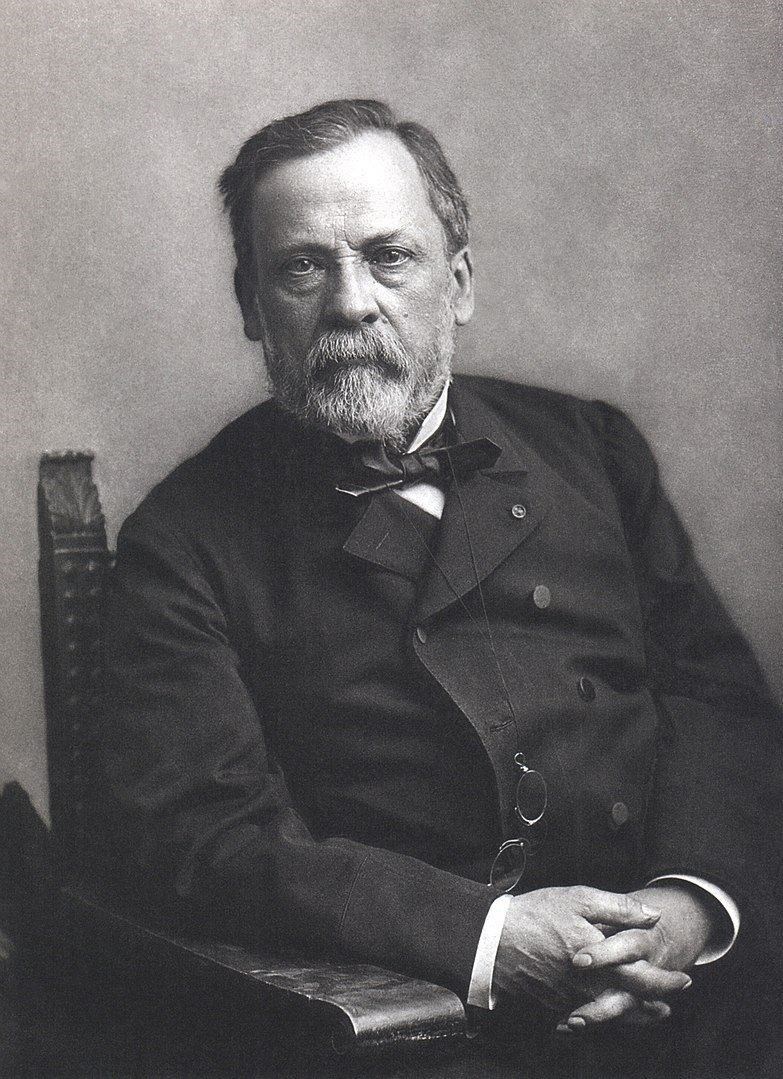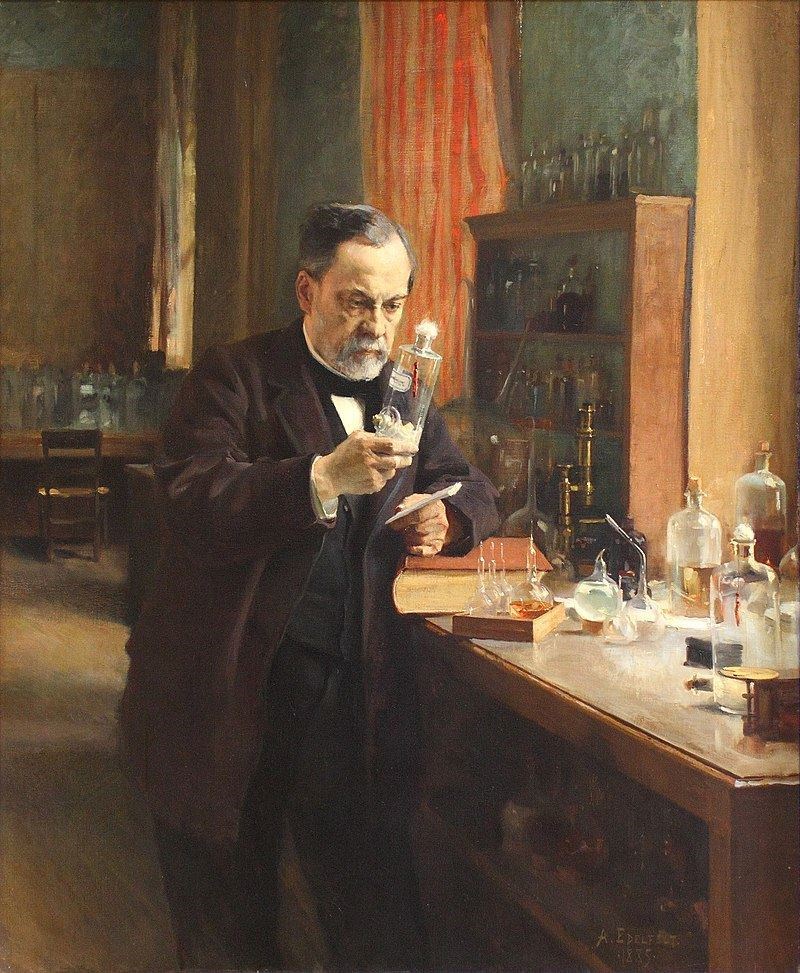 Louis PasteurBy Paul Nadar - File:Louis Pasteur, foto av Paul Nadar.jpg, Public Domain, https://commons.wikimedia.org/w/index.php?curid=28039885“We confuse wealth with wisdom, assuming anyone worth millions must be smart. We rush to attach ourselves emotionally to people who are pretty, people score touchdowns, sing songs on MTV, play great parts in action movies. We want to feel good about the famous so we allow them to lead make-believe lives, our very own contrivance, the desperate hope that we will somehow feel better about ourselves because we heard or read or saw that this false idol or that creation of some political consultant was nice” (Barnicle).
Louis PasteurBy Paul Nadar - File:Louis Pasteur, foto av Paul Nadar.jpg, Public Domain, https://commons.wikimedia.org/w/index.php?curid=28039885“We confuse wealth with wisdom, assuming anyone worth millions must be smart. We rush to attach ourselves emotionally to people who are pretty, people score touchdowns, sing songs on MTV, play great parts in action movies. We want to feel good about the famous so we allow them to lead make-believe lives, our very own contrivance, the desperate hope that we will somehow feel better about ourselves because we heard or read or saw that this false idol or that creation of some political consultant was nice” (Barnicle).
A hero should be defined by their characteristics and traits rather than their accomplishments and wealth. A role model that perfectly fits this criteria is a man by the name of Louis Pasteur. Louis was born in 1822 in the small town of Dôle, France, as the son of a tanner (“Louis Pasteur.” Science History Institute). He grew up with an acute academic mind, but was fascinated by science. His fascination grew into desire, and he began his work in the medicinal field. “In his research campaign against disease Pasteur first worked on expanding what was known about anthrax, but his attention was quickly drawn to fowl cholera. This investigation led to his discovery of how to make vaccines by attenuating, or weakening, the microbe involved” (“Louis Pasteur.” Science History Institute). Louis Pasteur proved his heroism when he dedicated his life to the betterment of humanity and pushed through his unimaginable setbacks to save countless lives.
Pasteur was the only capable scientist of his time that cared enough about improving the living conditions of all levels of society to dedicate his work to the people. Pasteur cared deeply about the betterment of societal health, so he decided to tackle the horrid, widespread problem of rabies: “Pasteur's next discovery won him widespread acclaim. Thousands of people in the nineteenth century died every year from rabies, a fatal disease of the nervous system contracted from the bite of an infected animal. After experiments failed to show any bacteria at work in rabid animals, Pasteur realized the cause was another kind of germ (later called a virus) that was too small to be detected by a microscope. Following extensive work he succeeded in creating a vaccine against rabies. The vaccine was effective in animals but Pasteur was unwilling to risk experimenting on humans. Then in 1885 a boy named Joseph Meister, who had been bitten by a rabid dog, was brought to him. Since symptoms of rabies take several weeks to develop, Pasteur knew the vaccine would have time to take effect--and possibly save Meister's life--after the bite. Undoubtedly the boy would have died without it, so Pasteur injected him with the vaccine. He continued the injections over several days, and the child remained perfectly healthy. When Meister grew up, he became the gatekeeper at the Pasteur Institute, which Pasteur founded in Paris in 1888 to promote research on rabies” (“Louis Pasteur.” Scientists: Their Lives and Works).
Pasteur cared enough about society to devote countless years into creating a cure for the disease that was taking many lives from his country, yet he was unwilling to test his vaccine on humans, fearing cruelty. When he was presented with the child, he cared enough to use his hard-earned vaccine to save the boy’s life. Then, he paid for an institute to raise awareness for rabies, and to help save the lives of many who would have eventually died from the devastating disease. Louis’ dedication to curing and protecting against disease allowed his accomplishments and the overall care for humanity to soar, “Nineteenth-century French scientist Louis Pasteur made major contributions to chemistry, microbiology, and medicine. Through his study of disease, Pasteur sought to improve public health and the human condition. His discoveries regarding the role of germs in disease and infection revolutionized medical practice, and helped reduce mortality significantly. He advanced the understanding of vaccination as a way to prevent illness, and he developed methods of food preservation, including pasteurization, that are still used today” (Anderson). Louis dedicated his life to improving the quality and mortality rate of human life. Without his discoveries, millions of people would not be here today. His whole world revolved around saving the lives of complete strangers because he cared about the human race as a whole. Pasteur’s big heart allowed his determination and care for humanity to flourish. He saved countless lives in the process, proving him heroic.
Louis lost everything that ever mattered to him in a very short span of time, but was determined enough to save lives that he continued his work. Once Pasteur’s career began to take flight, the unbearable happened, but he continued on to cure the deadliest of diseases: “Finding that his job at the École Normale left him too little time to do his experiments, Pasteur resigned in 1867. Napoleon III, the French emperor, agreed to help establish a special laboratory for him at the École. The following year Pasteur suffered a stroke that nearly killed him, leaving his left arm and leg permanently paralyzed. From then on his wife assisted him in his experiments. A few years earlier his father and his two-year-old daughter, Camille, had died; shortly after that, another daughter, Cecile, age twelve, died of typhoid fever. Yet, during this time of deep suffering that Pasteur accomplished some of his greatest work” (“Louis Pasteur.” Scientists: Their Lives and Works).
Louis had experienced the worst years of his life back to back. He had to resign from his dream job and he nearly died from a stroke that left him partially paralyzed, and both of his daughters died from diseases. Yet, in this dark time, he persisted and created his greatest accomplishments. He was determined to not allow those setbacks hold him back from doing what he loved. Pasteur buried himself in work and discovery to make good come from his pain: “Pasteur's scientific triumphs coincided with personal and national tragedy. In 1865 his father died; his two daughters were lost to typhoid fever in 1866. Over-worked and grief-stricken, Pasteur suffered a cerebral hemorrhage in 1868 which left part of his left arm and leg permanently paralyzed. Nonetheless, he pressed on, hardly with interruptions, on his study of silkworm diseases, already sensing that these investigations were but his apprenticeship for the control of the diseases of higher animals, including humans” (“Louis Pasteur.” Encyclopedia of world biography).
 Louis Pasteur in his laboratory, surrounded by his apparatus that he used to conduct experiments.https://en.wikipedia.org/wiki/Louis_PasteurPasteur lost his father and two daughters all in a short span of one year. This was such a far setback that it caused him to become partially paralyzed, yet he was so determined to never let that hold him back from creating vaccines that he was able to continue to save countless lives. Pasteur had a hard life interwoven with grief and pain, but his determination conquered his fears and allowed him to succeed and live the life of a hero.
Louis Pasteur in his laboratory, surrounded by his apparatus that he used to conduct experiments.https://en.wikipedia.org/wiki/Louis_PasteurPasteur lost his father and two daughters all in a short span of one year. This was such a far setback that it caused him to become partially paralyzed, yet he was so determined to never let that hold him back from creating vaccines that he was able to continue to save countless lives. Pasteur had a hard life interwoven with grief and pain, but his determination conquered his fears and allowed him to succeed and live the life of a hero.
Louis is a hero because he single-handedly created vaccines that cured and saved the lives of countless individuals and he pushed through the agony and pain that he experienced every day to better the lives of society. Pasteur poured his heart and soul into his work and pushed through hard times with his burning passion for helping the people who couldn’t help themselves, making himself an inspirational hero to all. Pasteur lived a life filled with accomplishments that lead to the better health for the public, who deeply admired Louis for all he accomplished with his big heart, and determined mind. “Pasteur attended the Royal College in Besançon, earning his bachelor of arts degree in 1840 and bachelor of science degree in 1842. The following year, he attended the École Normale Supérieure in Paris, earning his master of science degree in 1845, and his doctor of philosophy degree in 1847. By the age of twenty-six, Pasteur was famous for his work on the structure of crystals. In 1848, he received an appointment as professor of physics at the Dijon Lycée. Shortly thereafter, he became a professor of chemistry at the University of Strasbourg. This was the start of a distinguished career at various French universities. He married Marie Laurent, with whom he had five children, only two of which survived childhood” (“Louis Pasteur” Animal Sciences). Louis is an example of never giving up on your hopes and dreams. He inspires many, including myself, to never let your dreams go, because if you truly believe in yourself and do what you love, you will accomplish them. Heroism is constantly confused with wealth and fame, but Louis Pasteur was an exception, as he earned his well-deserved title, a hero, through his big heart, determination, and inspiration.
Works Cited
Anderson, Tim. “Louis Pasteur.” Ebsco Biography Reference Center, 1 Aug. 2017,
web.b.ebscohost.com/brc/detail?vid=5&sid=8a1d38d6-c2b3-452a-837d-9f11c2f9e0ee%4
0pdc-v-sessmgr01&bdata=JnNpdGU9YnJjLWxpdmU%3d#AN=19632268&db=b6h.
Barnicle, Mike. “Heroes on Our Doorstep.” The Boston Globe, June 1994.
"Louis Pasteur." Animal Sciences, edited by Allan B. Cobb, Macmillan Reference USA, 2002.
Biography In Context,
https://link.galegroup.com/apps/doc/K2642010022/BIC?u=powa9245&sid=BIC&xid=52787d58. Accessed 11 Dec. 2018.
"Louis Pasteur." Encyclopedia of World Biography, Gale, 1998. Biography In Context,
https://link.galegroup.com/apps/doc/K1631005071/BIC?u=powa9245&sid=BIC&xid=e459e746. Accessed 5 Dec. 2018.
“Louis Pasteur.” Science History Institute, 17 Jan. 2018,
www.sciencehistory.org/historical-profile/louis-pasteur.
"Louis Pasteur." Scientists: Their Lives and Works, UXL, 2006. Student Resources In Context,
https://link.galegroup.com/apps/doc/K2641500269/SUIC?u=powa9245&sid=SUIC&xid
068df3a8. Accessed 10 Dec. 2018.
Page created on 1/9/2019 8:27:29 PM
Last edited 12/24/2020 10:04:32 PM
